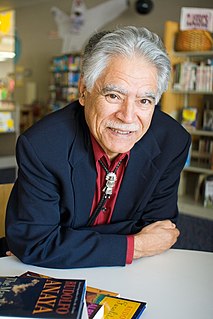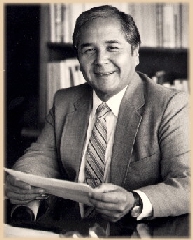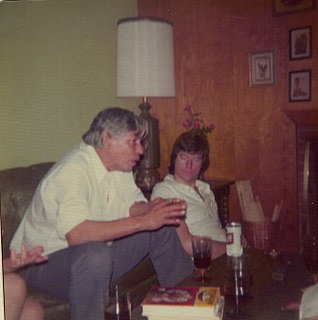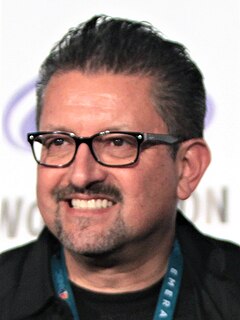Related Research Articles

Spanglish is any language variety that results from conversationally combining Spanish and English. The term is mostly used in the United States and refers to a blend of the words and grammar of the two languages. More narrowly, Spanglish can specifically mean a variety of Spanish with heavy use of English loanwords.

Mexican Americans are Americans of Mexican ancestry. In 2019, Mexican Americans comprised 11.3% of the US population and 61.5% of all Latino Americans. In 2019, 71% of Mexican Americans were born in the United States, though they make up 53% of the total population of foreign-born Latino Americans and 25% of the total foreign-born population. The United States is home to the second-largest Mexican community in the world, second only to Mexico itself. Most Mexican Americans reside in the Southwest. Many Mexican Americans living in the United States have assimilated into US culture which has made some become less connected with their culture of birth and sometimes creates an identity crisis.

Hispanic and Latino Americans are Americans of Spanish or Latin American ancestry. More broadly, these demographics include all Americans who identify as Hispanic or Latino regardless of ancestry. As of 2020, the Census Bureau estimated that there were almost 65.3 million Hispanics and Latinos living in the United States and Puerto Rico.

Rudolfo Anaya was an American author. Noted for his 1972 novel Bless Me, Ultima, Anaya was considered one of the founders of the canon of contemporary Chicano literature. The themes and cultural references of the novel, which were uncommon at the time of its publication, had a lasting impression on fellow Latino writers. It was subsequently adapted into a film and an opera.
Mexican American history, or the history of American residents of Mexican descent, largely begins after the annexation of Northern Mexico in 1848, when the nearly 80,000 Mexican citizens of California, Nevada, Utah, Arizona, Colorado, and New Mexico became U.S. citizens. Large-scale migration increased the U.S.’ Mexican population during the 1910s, as refugees fled the economic devastation and violence of Mexico’s high-casualty revolution and civil war. Until the mid-20th century, most Mexican Americans lived within a few hundred miles of the border, although some resettled along rail lines from the Southwest into the Midwest.
Latino studies is an academic discipline which studies the experience of people of Latin American ancestry in the United States. Closely related to other ethnic studies disciplines such as African-American studies, Asian American studies, and Native American studies, Latino studies critically examines the history, culture, politics, issues, sociology, spirituality (Indigenous) and experiences of Latino people. Drawing from numerous disciplines such as sociology, history, literature, political science, religious studies and gender studies, Latino studies scholars consider a variety of perspectives and employ diverse analytical tools in their work.
Quinto Sol was the first fully independent publishing house to surface from the Chicano movement in the Sixties. Editorial Quinto Sol was founded in 1967 at UC Berkeley by Octavio I. Romano, a Professor of Behavioral Science and Public Health, in collaboration with Nick C. Vaca and Andres Ybarra. The name "Quinto Sol" is Spanish for "Fifth Sun" and it refers to the Aztec myth of creation and destruction. Since the beginning of the Chicano movement in the 1960s, this concept has become a pathway to cultural expression. The Fifth Sun has constantly been integrated into the music, art and literature of the Chicano idea.

Tomás Rivera was a Chicano author, poet, and educator. He was born in Texas to migrant farm workers, and worked in the fields as a young boy. However, he achieved social mobility through education—earning a degree at Southwest Texas State University, and later a Doctor of Philosophy degree (PhD) at the University of Oklahoma—and came to believe strongly in the virtues of education for Mexican-Americans.
José Antonio "Tony" Burciaga was an American Chicano artist, poet, and writer who explored issues of Chicano identity and American society.
Latino poetry is a branch of American poetry written by poets born or living in the United States who are of Latin American origin or descent and whose roots are tied to the Americas and their languages, cultures, and geography.
Chicano poetry is a branch of American literature written by and primarily about Mexican Americans and the Mexican-American way of life in society. The term "Chicano" is a political and cultural term of identity specifically identifying people of Mexican descent who are born in the United States. In the same way that American poetry comprises the writing of the offspring of English and other European colonists to North America, so Chicano poetry and literature comprises the writing of the offspring of Latinos who either emigrated to the United States or were involuntarily included in the country due to the Mexican–American War of 1848.
Chicana/o studies, also known as Chican@ studies, originates from the Chicano Movement of the late 1960s and 1970s, and is the study of the Chicana/o and Latina/o experience. Chican@ studies draws upon a variety of fields, including history, sociology, the arts, and Chican@ literature. The area of studies additionally emphasizes the importance of Chican@ educational materials taught by Chican@ educators for Chican@ students.
Chicano literature, or Mexican-American literature, refers to literature written by Chicanos in the United States. Although its origins can be traced back to the sixteenth century, the bulk of Chicano literature dates from after the 1848 United States annexation of large parts of Mexico in the wake of the Mexican–American War. Today, this genre includes a vibrant and diverse set of narratives, prompting critics to describe it as providing "a new awareness of the historical and cultural independence of both northern and southern American hemispheres".

José Antonio Villarreal was an American Chicano novelist. Villarreal was born in 1924 in Los Angeles, California, to migrant Mexican farmworkers. Like Juan Manuel Rubio in Pocho, Villarreal's father fought with Pancho Villa in the Mexican Revolution. He spent four years in the Navy before attending the University of California at Berkeley in 1950.
American literature written in Spanish in the United States dates back as 1610 when the Spanish explorer Gaspar Pérez de Villagrá published his epic poem Historia de Nuevo México. He was an early chronicler of the conquest of the Americas and a forerunner of Spanish-language literature in the United States given his focus on the American landscape and the customs of the people. However, it was not until the late 20th century that Spanish language literature written by Americans was regularly published in the United States.

Lalo Alcaraz is an American cartoonist most known for being the author of the comic La Cucaracha, the first nationally syndicated, politically themed Latino daily comic strip. Launched in 2002, La Cucaracha has become one of the most controversial in the history of American comic strips.
This is a Mexican American bibliography. This list consists of books, and journal articles, about Mexican Americans, Chicanos, and their history and culture. The list includes works of literature whose subject matter is significantly about Mexican Americans and the Chicano/a experience. This list does not include works by Mexican American writers which do not address the topic, such as science texts by Mexican American writers.
Jorge Alfonso Huerta is a Chicano scholar, author, and theater director. He specializes in Chicano and United States Latinx Theatre. He has written and edited several books specializing in Chicano theatre and is considered to be an authoritative expert in his field.
Alvaro Huerta is a joint faculty member of Urban & Region Planning (URP) and Ethnic & Women’s Studies (EWS) at California State Polytechnic University, Pomona.
A Mexican American is a resident of the United States who is of Mexican descent. Mexican American-related topics include the following:
References
- ↑ "Acentos Review Craig Santos Pérez Review". Acentos Review Craig Santos Pérez Review. Retrieved 7 January 2012.
- ↑ "Deep Oakland Person Javier O. Huerta". Archived from the original on 3 March 2016. Retrieved 7 January 2012.
- ↑ "LatinoLA A&E: Q and A with Javier O. Huerta" . Retrieved 7 January 2012.
- ↑ "UC Berkeley English Profile Javier O. Huerta" . Retrieved 7 January 2012.